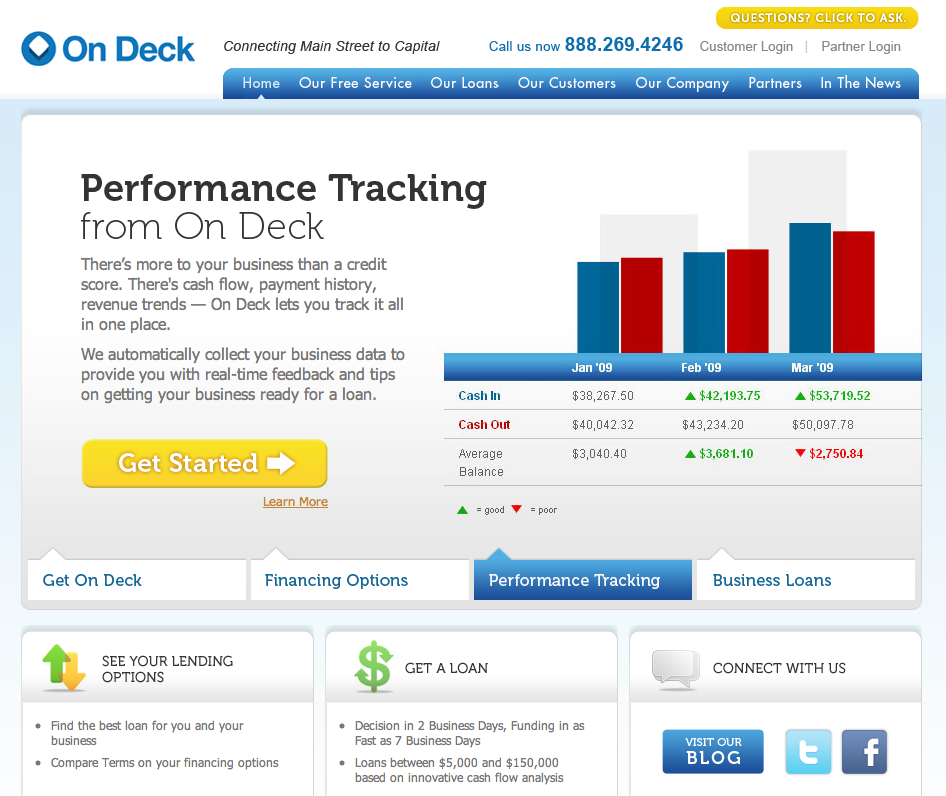On Deck Capital, the platform that helps connect small businesses with capital, has raised $19 million of its own in a series C funding round. The startup raised $15 million back in January from SAP Ventures and recently added another $4 million from SF Capital Group, a New York–based private investment firm. As part of the new funding, SF Capital Group President Neil Wolfson will be joining On Deck’s board of directors. Wolfson joins David Hartwig, the managing director at SAP, who signed on to the board following his firm’s investment. On Deck has raised a total of $38 million from investors including Contour Venture Partners, First Round Capital, Khosla Ventures, RRE Ventures and Village Ventures.
On Deck has been on a good run lately, as its added two senior executives to its sales and business development teams, made an appearance at a Clinton Global Initiative forum in Chicago, has doubled its month-to-month growth in customer acquisitions (to 4,000 customers) and loan applications in 2011, and has now connected small businesses with over $125 million in capital (at an average of loan size of $30K). You can read our original coverage of On Deck here.
Launched in 2006, On Deck uses a blend of data aggregation and electronic payment technology to bring an alternative form of evaluating the health of small businesses in an effort to efficiently bring capital to small and medium sized businesses. While TechCrunch and other technology publications regularly cover startups raising big rounds from venture capital firms and angel investors (ahem, like this one), the truth is that there is an enormous population of small businesses in the U.S. that are unable to raise money from high-powered venture firms.
Traditionally, the avenue to capital for the many mom-and-pop shops on Main Street has been to apply for a bank loan. So, not only do businesses lack access to venture capital, but it is also a market that has been underserved by these traditional bank loans.
On Deck believes that the fundamental problem Main Street businesses face is not a credit and capital one (as it is so often diagnosed), but instead is an issue of time and technology. What does that mean? SMBs often cannot afford (or lack the expertise) to complete lengthy loan packages, and, on the flip side, banks are unwilling to afford the (admittedly prohibitive) expense of underwriting the sub-$250K financing space — not to mention those under $100K, for which the process is even more tedious.
As a result, banks are largely forced to rely on the personal credit score of the business owner in evaluating a loan application, which is often a highly inaccurate reflection of the health of the business. Thus, On Deck tackles this problem by utilizing software that investigates a number of data points, including how many customers the business has, cash flow, sales, and registered complaints — all in an effort to find out whether the business is solid enough to repay a loan.
So, instead of going on the personal credit score of the business owner, the company offers what it calls the “On Deck Score”, which is a business credit score developed to provide lenders with an effective measure of a small business’ creditworthiness. The On Deck Score was developed in partnership with Equifax.
Because the startup’s platform allows businesses to create merchant profiles, which links to electronic data sources, including online banking, accounting and merchant processing (and aggregates social, tax, and industry data), banks and lenders can more easily access a SMB’s complete financial profile. This saves lenders from the hassle of collecting the data themselves, or relying on personal credit scores to evaluate credit.
Considering the fact that there are currently 5 million businesses that have 25 employees or less — a segment the U.S. economy relies on for 40 percent of its jobs — On Deck is providing an exceedingly valuable service in facilitating the underwriting of these businesses, and its new infusion of capital will ensure that the startup continues to bring disruptive technology to an underserved (and sizable) segment of the market.
For more, check out On Deck at home here.

